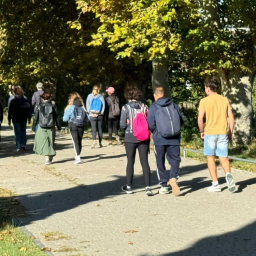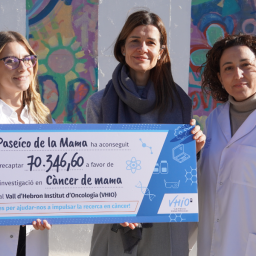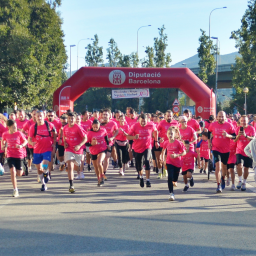
- Results from an international Phase IIa study point to the promise of adding bispecific HER2-targeted antibody zanidatamab to the combination of CDK4/6 inhibitor palbociclib plus hormone therapy with fulvestrant in heavily pretreated patients with HER2+/HR+ metastatic breast cancer.
- The targeting of all 3 pathways has achieved encouraging results which show promising progression-free survival at 6 months and median progression-free survival with durable responses. These primary data further support the development of a novel chemotherapy-free treatment regimen for this patient population.
- Selected as late breaking data, results of this study were presented today by first author Santiago Escrivá, Medical Oncologist at the Vall d’Hebron University Hospital (HUVH) and Clinical Investigator of VHIO’s Breast Cancer Group, at the San Antonio Breast Cancer Symposium (SABCS), 05-09 December.
Led by VHIO investigators, this Phase IIa international and multicenter study was designed to evaluate the efficacy of adding the bispecific HER2-targeted antibody zanidatamab to the combination of CDK4/6 inhibitor palbociclib plus hormone therapy fulvestrant for the treatment of heavily pretreated patients with HER2+/HR+ metastatic breast cancer (mBC).
Reported today at SABCS 2023 (1) in Texas, primary results show that 67% of patients treated with this triplet combination were progression-free at 6 months, with a median progression-free survival of 12 months, and durable responses of a median of 15 months.
“In the majority of cases, HER2+ metastatic breast cancer remains incurable. Identifying and developing novel HER2-directed therapies including less toxic chemotherapy-free strategies will ultimately improve outcomes for an increasing number of our patients,” says Santiago Escrivá, Clinical Investigator of VHIO’s Breast Cancer Group directed by Cristina Saura, and lead author of this study.
Zanidatamab is a bispecific HER2-targeted antibody that binds HER2 in a unique trans configuration, driving multiple mechanisms of antitumor activity. Approximately 50% of HER2+ metastatic breast cancers are also hormone receptor-positive (HR+), making the estrogen pathway an additional cancer drug target. The CDK4/6 inhibitor palbociclib plus hormone therapy with fulvestrant is approved for HER2+/HR+ mBC.
By targeting these three pathways at the same time, zanidatamab in combination with palbociclib plus fulvestrant showed promising progression-free survival results with a median of 12 months with durable responses and a manageable safety profile in this patient population.
“These primary results support the continued development of this new chemotherapy-free regimen for heavily pretreated patients with HER2+ HR+ metastatic breast cancer,” concludes Escrivá.
Co-first authored by Mafalda Oliveira, Medical Oncologist at HUVH and Clinical Investigator of VHIO’s Breast Cancer Group, patient-reported outcomes from the Phase III CAPItello-291 trial were also presented this week at SABCS 2023 (2). The primary results of this study, which previously published in The New England Journal of Medicine (N Engl J Med. 2023 Jun 1), showed that the combination of fulvestrant with novel AKT inhibitor capivasertib significantly improved progression-free survival versus fulvestrant plus placebo, in patients with metastatic HR+/ HER2- breast cancer who had progressed on or after prior endocrine therapy, with or without a CDK4/6 inhibitor.
The investigators have now evaluated the effect of this novel strategy on health-related quality of life and how much the side effects of treatment bothered the study participants and affected their ability to function.
By analyzing questionnaires completed by the participants, to see how quality of life changed between the start of treatment and at different times during the clinical trial, they found that overall, health-related quality of life was not negatively affected by adding capivasertib to fulvestrant. These data were presented at this year’s SABCS meeting by lead author Hope S. Rugo, Professor of Medicine, Division of Hematology and Oncology at the University of California San Francisco Helen Diller Family Comprehensive Cancer Center.
“Together with the efficacy and manageable safety profile of this combination, demonstrated by the results of the CAPITello-291 trial, these data further support the positive benefit-risk profile of this treatment strategy in this patient population,” says Mafalda Oliveira.
Also presented at SABCS 2023, were the updated results from the POSITIVE study (3). This multicenter and international study is coordinated in Spain by the SOLTI Breast Cancer Research Group and GEICAM Spanish Breast Cancer Group and co-authored by Cristina Saura, Principal Investigator of VHIO’s Breast Cancer Group and Head of the Breast Cancer Unit at HUVH.
Supporting the first results of this study which were presented at SABCS 2022 and subsequently published in The New England Journal of Medicine (N Engl J Med. 2023 May 4), the updated data showed that the temporary interruption of endocrine therapy—under the close medical surveillance of multidisciplinary teams, and for a period of no longer than two years—in select women aged 42 or younger with previous hormone receptor-positive early breast cancer attempting pregnancy does not increase the short-term risk of disease recurrence.
Additional data presented at this SABCS meeting by first author Hatem A. Azim, Adjunct Professor, Medical Oncology, School of Medicine at the Monterry Institute of Technology, Mexico, showed that young age was the main factor associated with shorter time to pregnancy and that there is no increase in breast cancer events in patients undergoing IVF. Even though longer follow-up is required, results are encouraging and of paramount importance for oncofertility counselling of young breast cancer patients.
###
Respective SABCS 2023 session details:
All times are CENTRAL Time.
- Friday, December 8
Late Breaking Abstracts Oral Session, Star at Night Ballroom 1-2
12:00 pm – 12:45 pm
Moderators: Evanthia Roussos Torres, University of Southern California, Los Angeles, California and Nicholas C. Turner, Royal Marsden Hospital, Institute of Cancer Research, London, United Kingdom
LBO1-04 Primary results from a phase 2a study of zanidatamab (zani) + palbociclib (palbo) + fulvestrant (fulv) in HER2+/HR+ metastatic breast cancer (mBC)
Presenter: Santiago Escrivá-de-Romani, Vall d’Hebron Institute of Oncology (VHIO), Vall d’Hebron University Hospital, Barcelona, Spain
- Tuesday, December 5
CONCURRENT POSTER SPOTLIGHT SESSIONS BLOCK #1
PS02 Improving QOL and Care Delivery for the Breast Cancer Patient, Hemisfair Ballroom 1-2
5:30 pm – 6:30 pm
Moderator: Anne Blaes, University of Minnesota, Minneapolis, Minnesota
PS02-02 Patient-reported outcomes from the Phase 3 CAPItello-291 trial investigating capivasertib and fulvestrant for patients with aromatase inhibitor-resistant HR-positive/HER2-negative advanced breast cancer
Presenter: Hope S. Rugo, University of California San Francisco Helen Diller Family Comprehensive Cancer Center, San Francisco, California
- Thursday, December 7
General Session 2, Hall 1
8:15 am – 11:15 am
Moderators: Antoinette R. Tan, Levine Cancer Institute, Atrium Health, Charlote, North Carolina and Roshni Rao, Columbia University Vagelos College of Physicians, New York, New York
GS02-11 Fertility preservation and assisted reproductive technologies (ART) in breast cancer (BC) patients (pts) interrupting endocrine therapy (ET) to attempt pregnancy
Presenter: Hatem A. Azim, Jr., Monterrey Institute of Technology, Monterrey, Mexico
About the San Antonio Breast Cancer Symposium®
Since 1977, the San Antonio Breast Cancer Symposium® (SABCS®) has been the leading scientific conference for basic scientists, physician-scientists, clinical investigators and breast care providers, and advocates seeking an exchange of new information in experimental biology, etiology, prevention, diagnosis, and therapy of premalignant breast disease and breast cancer. Founded, owned, and operated by UT Health San Antonio, the symposium has grown to a five-day event attended by an international audience of academic investigators and private physicians from over 80 countries to attain information through abstract presentations, panel discussions, research findings, and state-of-the-art educational sessions. UT Health San Antonio, with co-sponsor the American Association for Cancer Research, supports SABCS, which provides education and accessibility to the latest information regarding the prevention, diagnosis, and treatment of premalignant breast cancer and breast disease. For more information on SABCS, visit: www.sabcs.org.























